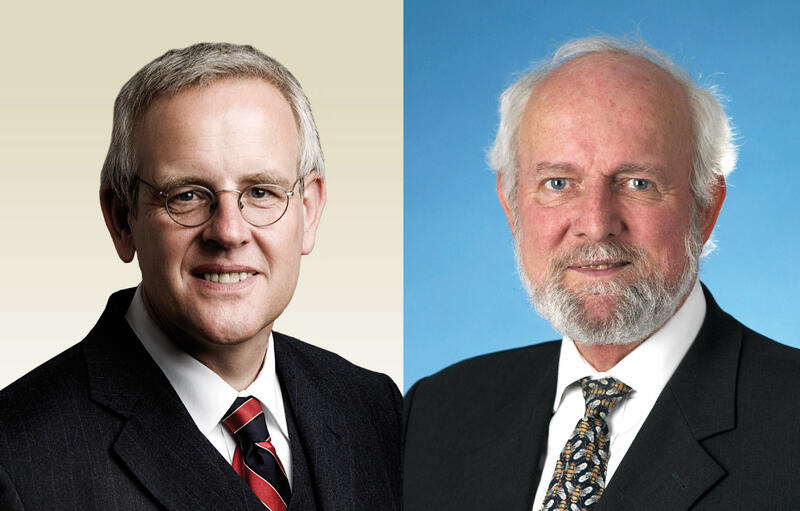Prize-winners as pioneers of sustainable management: Ernst Ulrich von Weizsäcker and Holger Zinke
In 2008, the German Environmental Award, presented by the Deutsche Bundesstiftung Umwelt (DBU), focuses on the careful treatment of natural resources, an informed use of energy, and sustainable management: Prof. Ernst Ulrich von Weizsäcker (69), Dean of the Donald Bren School of Environmental Science & Management at the University of California (Santa Barbara), and Dr Holger Zinke (45), founder of the biotech company BRAIN AG (Zwingenberg), will receive Europe’s most lucrative environmental prize, worth 500,000 euros, in the Rostock Town Hall on 26 October. It will be presented by German President Horst Köhler. Prof. von Weizsäcker is being honoured for his decades of outstanding work in promoting sustainable management strategies in politics, business and society worldwide. Dr Zinke is receiving the award for his great success in using innovative “white” bio-technology to develop new types of natural compounds for industrial production, thus protecting the environment. Each of the prize-winners is to receive 250,000 euros.
Von Weizsäcker an “outstanding personality who is known worldwide for finding revolutionary answers to global environmental problems”
Announcing the two new prize-winners, the Secretary General of the DBU, Dr Fritz Brickwedde, praised the nephew of former German President Richard von Weizsäcker as an “outstanding personality who is known worldwide for finding revolutionary answers to global environmental problems”. Prof. von Weizsäcker, he said, had the rare and extremely important gift of being able to communicate complicated environmental topics in a comprehensible manner and to convey them in down-to-earth terms to people coming from different spheres and a variety of backgrounds. He also commended Prof. von Weizsäcker’s work in giving exemplary advice to leading figures in business, politics and science at both a national and international level, and in establishing networks of experts from different scientific disciplines to the benefit of the environment.
For many years Prof. von Weizsäcker had called for an unconditional efficiency revolution
Dr Brickwedde said that it was not only as a physicist and versatile biologist that Prof. von Weizsäcker had left his mark over the decades of his career: as a brilliant expert on the environment and eco-efficiency, he had also published influential books, such as the best-seller “Factor Four” (1995). For many years, he said, Prof. von Weizsäcker had called for an unconditional efficiency revolution. Prof. von Weizsäcker believes that wealth can be doubled while halving the use of natural resources and that the quality of life can even be improved in the process. He is convinced that the vicious circle of growing economy and increased pollution can be stopped by means of sustainable management. Dr Brickwedde went on to say that Prof. von Weizsäcker’s scientifically founded ideas on environmental protection had an established place in present-day policies on climate and environment: “Environmental policies now go far beyond the national framework. They play a decisive role in peace processes and development worldwide. We owe this partly to the work of Ernst Ulrich von Weizsäcker.”
Dr Zinke played a pioneering role in a field of work with a high social, economic and ecological significance
The company BRAIN (Biotechnology Research and Information Network) AG, with its founder Dr Holger Zinke, carries out research on compounds from nature, coming from micro-organisms, which can be used to replace and improve chemical products and processes, making them environmentally-friendly methods. “For industrial or ‘white’ biotechnology helps to save energy and materials, reduces the burden on non-renewable resources, protects the environment and improves the economic value added. Dr Zinke was one of the first entrepreneurs to recognise and make use of this potential,” Dr Brickwedde said. He said Dr Zinke played a pioneering role in a field of work with a high social, economic and ecological significance. In so doing, he said, Dr Zinke helped to establish sustainability on a natural and biological basis in industrial production processes and to increase independence from fossil resources.
For the first time, the entire toolkit of nature has been made available for industrial purposes
Dr Brickwedde said that the potential hidden in millions of different species of tiny living organisms had received little notice until only a few years ago, as only one percent of these organisms could be bred in the laboratory. Since Holger Zinke founded his company in the 90s, he said, a lot has changed: gene technology and a great deal of developmental research made it possible to “decipher” the genetic information of non-cultivable organisms. In this way, formerly inaccessible micro-organisms and their synthetic potential could be exploited for the first time in industrial production. “The approach taken by Dr Zinke and his team is innovative, because now, for the first time, the entire toolkit of nature has been made available for industrial purposes,” Dr Brickwedde said. For example, he said, a type of washing detergent enzyme has been invented that saves over a million tons of carbon dioxide per year.
Information for journalists: Please find the long versions, photos, vitae, interviews and audio excerpts (spoken quotes, mp3-files) for free download and use of Prof. Dr. Ernst Ulrich von Weizsäcker and Dr. Holger Zinke.

©